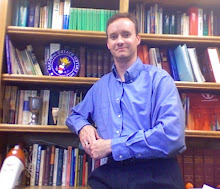Fourth Sunday After Epiphany
Ordinary Time 4 January 30, 2005
My sermon for this week is published in the most-excellent preaching resource: Biblical Preaching Journal
 Please visit their web site for subscription details.
Here are some excerpts from my sermon:
Please visit their web site for subscription details.
Here are some excerpts from my sermon:
Moving Beyond the Church-Talk
As we do in most areas of our life, we have created a particular way of talking in church when we pray, when we preach, when we sing, when we invoke, when we benedict: “The Lord bless you and keep you; the Lord make his face to shine upon you.” It mimics theological ideas, biblical stories. Often, the manner of speaking clearly has arisen from language we find in older translations of the Bible. So our elders may still stand behind the table thanking Christ for “this thy table.” It’s odd in any other context, but not here. Here, it’s church-talk.The beatitudes we hear as Jesus begins his Sermon on the Mount have just such a quality. “Blessed are the poor in spirit… Blessed are those who mourn… Blessed are the meek, for they will inherit the earth.” (Matt 5:3-5 NRSV). No manager places a sign on aisle seven that reads, “Blessed is the one who asks a clerk for help, for they will inherit the 50 pound bag of dog food on the bottom rack of their grocery cart.” Elsewhere, it would be strange, but here, it just sounds like church-talk, like bible-speak. Matthew, in particular.A second, shorter version of the beatitudes is found in the gospel of Luke. While in Matthew, Jesus says “Blessed are the poor in spirit,” in Luke he simply says “Blessed are you who are poor.” Or when in Matthew Jesus says “Blessed are those who hunger and thirst for righteousness,” in Luke Jesus says more poignantly, “Blessed are you who are hungry now.” For this reason, scholars often conclude that Matthew has added a spiritual context to the simplified and realistic earthy version found in Luke. Matthew has “spiritualized” the saying, presented the language in a manner that had wide appeal and applicability in the church context. He made it into church-talk.Truly, it is tempting to see it as such—to encounter these beatitudes and place them beside the “thee’s” and “thou’s”, the “begat’s” and “amen’s”. But far too often, church-talk becomes the kind of language that sounds swell and is worth repeating but hardly makes its way into the core of our identity. It becomes the stuff of rote memory, recited without relishing, told without thinking, proclaimed without processing...At times, church-talk, comes dangerously close to pleasantry. A few verses later in the Sermon on the Mount, the church-talk peaks. (Matt. 5:39-41)
- “If anyone strikes you on the right cheek, turn the other also.” Uh huh.
- “If anyone wants to sue you and take your coat, give your cloak as well.” Allll-righty.
- “If anyone forces you to go one mile, go also the second mile.” Now, what am I supposed to do with that?!?
And as if the spiritualizing wasn’t enough for Matthew, there’s more. Jesus speaks in these promises of comfort and inheritance, words
of hope and assurance. The hope he proclaims is not only a spiritual one, but
an eschatological hope, one that looks forward to the eschaton, to the manner
in which God will bring fulfillment to the world. Christ maintains an order of
blessing that seems counter to the current state of the world, and he does so
by means of the assurance of God’s reign drawing near. Jesus here expresses a
future hope regarding the Kingdom of Heaven
- “Blessed are the poor in spirit, for theirs is the kingdom of heaven” (Matt. 5:3)
- “Blessed are those who are persecuted for righteousness’ sake, for theirs is the
kingdom of heaven” (Matt. 5:10)
This phrase is key in Matthew (some 32 times and never in the other gospels). From the outset, John the Baptist appears on the scene, announcing the arrival of Jesus, calling to repentance “for the kingdom of heaven has come near.” (3:2) The gospel message is a grand and bold proposal, and its thesis statement is that the woes of the day pale in comparison with the promise of the morrow. But such a statement, such church-talk, of the great by and by and pie in the sky can once more overshadow the impact of Christ’s invitation to identify with the community of faith which he is trying to describe.
For everything we know about the future determines how we live in the present. I can get through today because of what I know about tomorrow. An encounter with Christ is the fulfillment of the gospel. Jesus’ proclamation of mercy and fullness, relationship and inheritance is not onlythe promise for God’s future, but in a very real way has come near.
Imagine for a moment, if we can, to see through the haze of all the paradoxical semantics, all the bible speak… imagine for a moment thatJesus wasn’t using church-talk...

